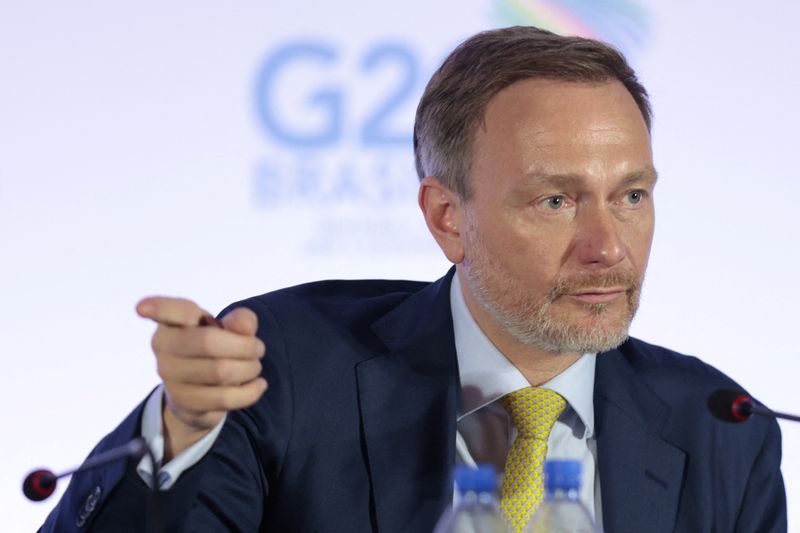
©Reuters. German Finance Minister Christian Lindner speaks at a news conference during the meeting of G20 finance ministers and central bank governors in Sao Paulo, Brazil, February 29, 2024. REUTERS/Carla Carniel
2/5
By Marcela Ayres and Christian Kraemer
SAO PAULO (Reuters) – Financial leaders of the world’s major economies failed to agree on a joint statement at the conclusion of talks on Thursday, with divisions over the wars in Gaza and Ukraine overshadowing efforts to create a consensus on global economic development.
Brazil, which hosted the finance ministers and heads of central banks from the main economies of the Group of Twenty (G20), published its own summary in place of a shared statement. India took a similar line during its G20 presidency last year, but still rallied most G20 members to condemn Russia for invading Ukraine.
Brazil’s summary, in line with a draft statement seen by Reuters on Tuesday, cites the economic risks of “wars and escalating conflicts” but urges debate about them elsewhere. It also noted a higher chance of a “soft landing” for the global economy, which could cool inflation without a severe recession.
Brazilian Finance Minister Fernando Haddad told reporters that differences among G20 foreign ministers discussing regional conflicts the week before had “tainted” talks on the financial issue, ruining efforts to reach a joint statement.
G20 officials argued late into the night and into the final hours of the meeting over how to describe the wars in a joint statement, with Russia and major Western nations at loggerheads over the language, according to people familiar with the matter.
Such geopolitical tensions ran through the two-day meeting, at times overshadowing the formal agenda, such as discussion of a global minimum wealth tax on the ultra-rich proposed by Brazil.
Last Thursday, German Finance Minister Christian Lindner said there was still hope that G20 finance ministers would agree on a statement that would refer to geopolitical risks to economic growth.
“There was a time when the lack of consensus was so small that it was about one word,” Haddad said, without providing details.
The G7 group of rich Western countries and Japan supported the idea of talking about war “against” Ukraine, while Russia wanted to describe it as war “in” Ukraine, two people familiar with the matter said.
G7 countries also backed language describing the war in Gaza as a “humanitarian crisis” without mentioning Israel, the sources said.
Brazilian officials hosting the event had sought to focus talks on economic cooperation to address issues such as climate change and poverty, but countries including Germany pushed for a joint statement mentioning the wars in Ukraine and Gaza.
Lindner insisted that it cannot be business as usual amid the war against Ukraine, the “terror” of Hamas and the humanitarian situation in Gaza.
“All this cannot leave us indifferent, all this must be discussed here,” he told reporters Thursday morning. “A draft has been prepared that reflects the request that geopolitical issues be discussed.”
THE AGENDA ON INEQUALITY
Despite the tensions hovering over the meeting in Sao Paulo, Achim Steiner, head of the United Nations Development Program (UNDP), called the start of the Brazilian presidency this year a success, as the only topic of the second day of financial talks was “in a nutshell” in a joint statement.
“Brazil has set clear priorities, for example, with its tax proposal,” Steiner told Reuters on Thursday.
As part of efforts to address inequality, Brazil has proposed discussions on a global minimum wealth tax that would ensure increased tax contributions from the super-rich.
“Even with slightly higher tax rates for the approximately 2,500 billionaires worldwide, very considerable additional revenue could be generated,” he said.
Brazil will aim to draft a declaration on international taxation by the group’s July summit, Finance Minister Fernando Haddad said on Thursday. He said he was expecting a report on the issue from the European Fiscal Observatory, which has supported a global wealth tax on the world’s richest people, in contrast to income taxes common in most major economies.
French Finance Minister Bruno Le Maire spoke out in favor of a global minimum tax on the world’s richest on Wednesday.
Japan’s representative Kanda, who is participating in the G20 talks on behalf of the country’s finance minister, said the group broadly endorsed Brazil’s proposal to highlight steps to address inequality as this year’s main agenda.